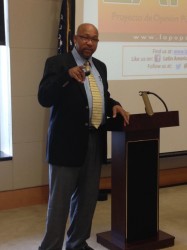
Jamaicans overwhelmingly disapprove of gay citizens running for political office, even more than they disapprove of regime critics doing so.
“Nearly seven out of 10 (69.1 percent) select the most extreme level of disapproval, while only 5.3 percent say they ‘strongly approve,’” says Balford A. Lewis, senior lecturer of sociology and research methodologies at the University of West Indies, Mona, and author of the new Insights study by the Latin American Public Opinion Project (LAPOP) at Vanderbilt University. (To read the study in Spanish, click here).
“Even if we combine the percentages on the approval side of the scale, that still only adds up to 11.1 percent of respondents approving of the right of homosexuals to run for public office,” Lewis says.
Comparatively, when Jamaicans are asked whether they support the right of citizens who are regime critics to run for office, their level of support is 41.6 degrees on a scale of zero to 100. Support for homosexuals enjoying the same rights is 16 degrees on the same scale.
“The marked difference (25.6 degrees) in these levels of support contrasts and illustrates a strong discriminatory tendency toward homosexuals with regards to their rights to freely participate in political processes,” Lewis says.
Of the 23 nations polled in Latin America and the Caribbean on this question, Jamaica ranks next-to-last (16 degrees on a scale of zero to 100) ahead of only Haiti (10.5 degrees). Uruguay is the most tolerant, at 78.2 degrees.
The author tested a number of conditions to see if they influenced how Jamaicans felt about homosexuals running for office.
Jamaicans who are more religious and less educated (primary school or less) are among those who are least likely to approve of the right of homosexuals to run for public office. Citizens with post-secondary education tend to be more approving of gays running for office.
Unsurprisingly, those who considered themselves to be political tolerant also had less or no issues with gays running for office.
“It may be that the rising levels of education will be the key to enhancing tolerance in this realm,” Lewis says.
LAPOP develops, implements and analyzes the AmericasBarometer public opinion surveys. Since the 1970s, LAPOP has gathered a treasure trove of public opinion data containing political perspectives from Latin American and Caribbean citizens. LAPOP data and reports are available to interested researchers at the LAPOP website. LAPOP covers 28 nations including all of North, Central and South America as well as a significant number of countries in the Caribbean.